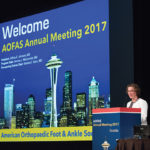 Event planners had predicted a 10-percent increase in attendance over the numbers they saw at the 2012 meeting in Nashville, according to Jennifer Ackerman, PRIMA’s deputy executive director.
Event planners had predicted a 10-percent increase in attendance over the numbers they saw at the 2012 meeting in Nashville, according to Jennifer Ackerman, PRIMA’s deputy executive director.
CHALLENGES
The jump was actually higher — there were approximately 12 percent more paying attendees on site this year. “We were ambitious with our budget numbers this year,” Ackerman said. “We had a really great conference last year in Nashville, so we tried to capitalize on that momentum and get people excited for Tampa.”
PRIMA’s 2010 Annual Conference had also been held in Florida, and organizers made an effort to differentiate this year’s meeting by providing new and inspiring content, and by showing participants that Tampa has different experiences to offer. Attendees reported that they liked the close proximity of the convention hotels — the Tampa Marriott Waterside and Embassy Suites Downtown — to the convention center, meaning they didn’t have to walk too far in the unpredictable Florida summer weather, which can alternate between heat and afternoon showers. In fact, 93 percent of attendees surveyed rated the conference as “excellent” or “very good,” Ackerman said, adding: “We like those numbers!”
INITIATIVES
One of the ways PRIMA ensured that this year’s meeting stood out from the 2010 version in Orlando was by planning elements that highlighted Tampa’s unique features — including an off-site visit to the Lowery Park Zoo, where attendees hand-fed giraffes and got an up-close view of elephants. “It was a unique space, and the attendees appreciated being able to visit a Tampa attraction after hours,” Ackerman said. A welcome reception at the Tampa Marriott Waterside in a ballroom overlooking the Ybor channel was also a hit with the more than 700 people who attended. “The hotel offered a great menu mix of standard banquet fare and unusual [offerings] like a crab-cake station,” Ackerman said. “We were very pleased.”
PRIMA had planned “hot-topic” sessions on issues that had been newsworthy in the months leading up to the conference, but it had to remove those from the schedule when both speakers canceled and organizers were unable to replace them. A general-session speaker also canceled, Ackerman said, but luckily a replacement was available. PRIMA still plans to attempt to hold those kinds of burning-issue programs at its 2014 Annual Conference.
Organizers also found that 86 percent of conference attendees had accessed some sort of social media to learn more about the event, so they knew that it was a preferred way for participants to get information. “We will definitely look for ways to reach a greater percentage of attendees next year in Long Beach,” Ackerman said.
Convene’s Pre-Con/Post-Con series asks meeting planners about their challenges and how they intend to address them (Pre-Con), and then circles back around after the meeting has occurred (Post-Con) to see how well they worked out.



